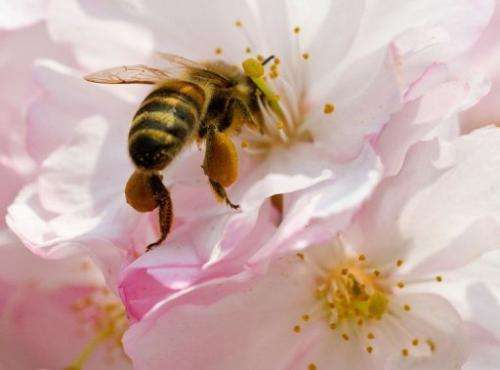Europe set to ban bee-killing pesticides (Update)

The European Commission received the go-ahead Monday to slap a two-year ban across the European Union on the use of pesticides blamed for a sharp decline in bee populations, an EU diplomat said.
A key committee cleared the way for the European Union executive to implement a two-year moratorium on three pesticides that is expected to enter into force late this year, a diplomat told AFP.
Countries opposed to the ban, including Britain and Hungary, failed to muster enough support to block it, with 15 nations, including France, voting in favour, France's EU delegation said on Twitter.
Germany, which in a previous vote had abstained and was under sharp pressure from pharmaceutical firms and farmers to oppose the proposal, also voted in favour, a diplomat said.
Bees account for 80 percent of plant pollination by insects, vital to global food production. Without them, many crops would be unable to bear fruit or would have to be pollinated by hand.
Pesticide producers Bayer of Germany and Switzerland's Sygenta, the top player on the global agrichemical market, have rejected claims that their products are at fault in the fall of bee numbers and say studies behind the suggested ban are based on flawed science.
Bees: Nature's little helpers under threat
Bees play a key role in human food production, pollinating more than two-thirds of the world's 100 most important crop species and providing a free service valued at tens of billions of euros.
They account for about 80 percent of pollination by insects, say agriculture agencies. Without bees, many plant and animal species would disappear and farmers would be left to fertilise crops by hand.
Yet bee numbers have slumped in Europe and the United States in the past 15-odd years due to a worrying phenomenon dubbed colony collapse disorder (CCD).
The mysterious plague, often characterised by a rapid loss of adult worker bees, has been blamed on everything from agricultural pesticide use, a loss of wild bee habitat, a virus or fungus, mites—or a combination.
The disorder has killed off about 30 percent of bees annually since 2007.
According to the UN Food and Agriculture Organisation, a third of the food we eat depends on bee pollination.
Some economists have valued the pollination services of insects, mainly bees, at about $190 billion (145 billion euros).
Bees transfer pollen that gets stuck on their hairy bodies while feeding on nectar from the male parts of flowers to the female parts.
European honeybees can make between seven and 14 trips a day, visiting dozens of flowers each time, according to an FAO background document.
A small colony with 25,000 forager bees, each making 10 trips a day, could pollinate 250 million flowers.
Types of plants that depend on honeybee pollination include apple and apricot trees, avocados, blackberries, cabbage, carrot, cotton, eggplant, melon, onion, strawberry and watermelon.
Drawing a link between the sudden northern hemisphere bee decline and pesticides like the ones now being banned by the European Union, has been controversial and vehemently denied by the agrochemical industry.
But in March, a study in the journal Nature Communications said some pesticides could scramble the brain circuits of honeybees—affecting memory and navigation skills needed to find food and causing colony collapse.
According to the American Beekeeping Federation's website, an average worker honey bee lives about six to eight weeks in summer—during which time each produces about one twelfth of a teaspoon of honey.
Each bee can fly the equivalent of one-and-a-half times the circumference of the Earth in a lifetime.
A healthy colony can have as many as 80,000 bees in the peak summer period, with the queen laying as many as 3,000 eggs per day.
© 2013 AFP


















